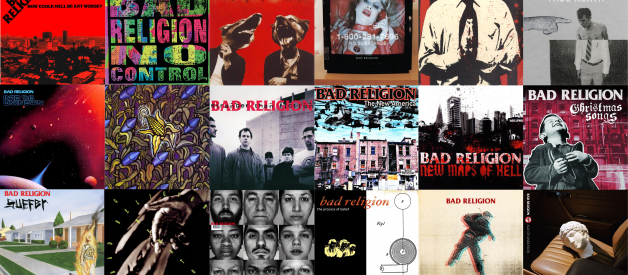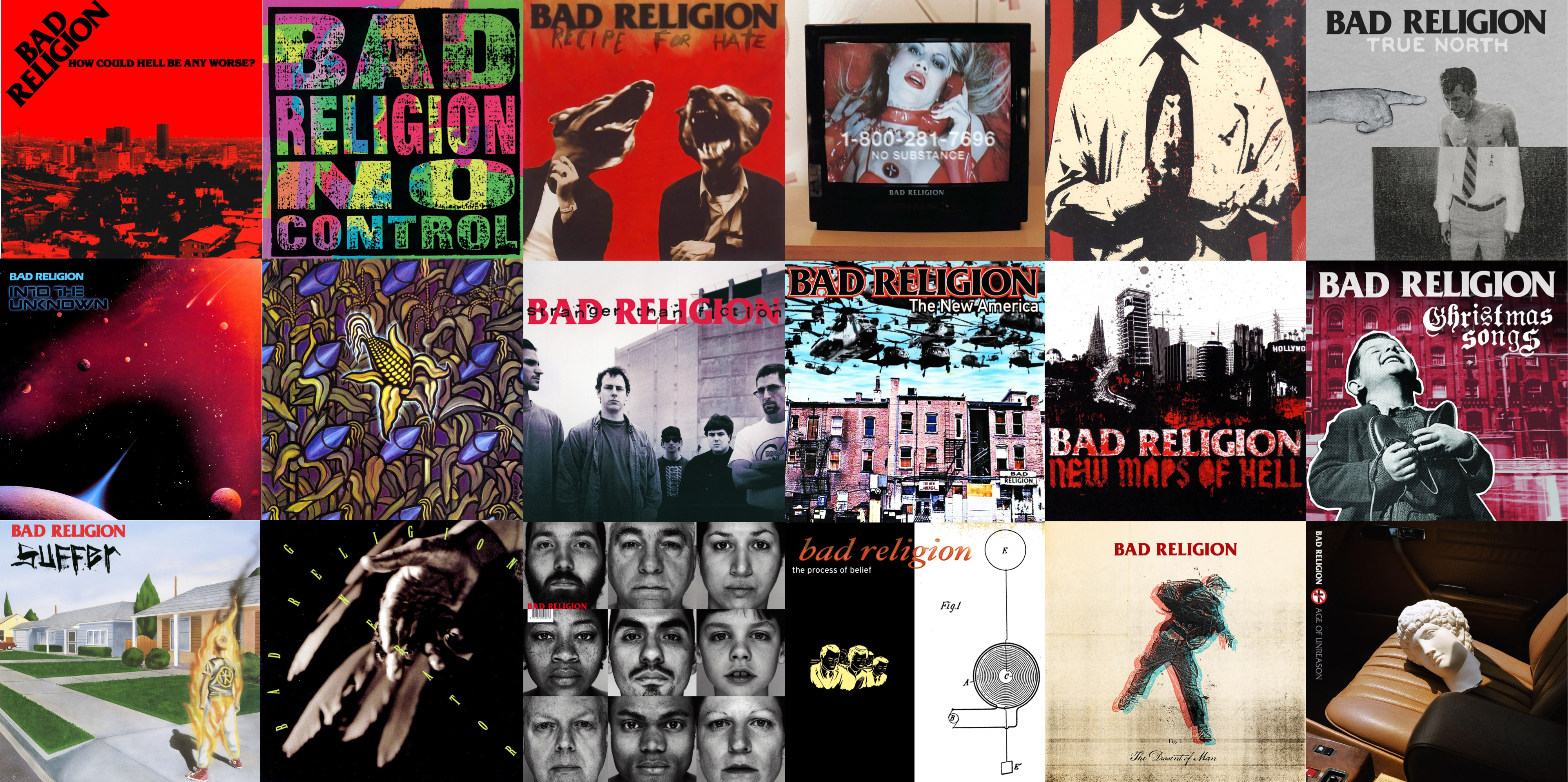
Where does one begin when ranking the studio album discography of not only one of the greatest and most influential punk bands of all times, but just one of the greatest bands (in general) of all time? A juggernaut of a group that heavily affected the sound of punk music through their 3 part harmonies, more technical style of play, and politically charged lyrics. A founding member (Brett Gurewitz) who formed one of (if not the most) famous punk record label and a singer (Greg Graffin) who has not only been the only member to appear on every Bad Religion album, but also holds a PhD and is an occasional lecturer at UCLA as well as an author of several successful books. Oh, and they also have one of the most recongized band logos in the ?cross-buster?.
Bad religion formed in 1980 and released their first album in 1982. After their second album ?Into the Unknown? was released in 1983, the band broke-up for their first and only time and reformed again in 1985. Over the course of their career the band has explored a few different sounds and they have approximately 4 different periods of sound, each period garnering different fans. This year (2019) marks Bad Religion?s first new album in 6 years, the longest break they?ve ever had between 2 records.
I could write several pages covering all of the different accomplishments of the band, but I?ll try to stick to a more focussed history of the most significant band members and their changes instead.
Greg Graffin [singer/songwriter]: The only constant member of Bad Religion and thus the main driving force behind the band as well. Much of the band?s accomplishments have rested on the shoulders of this man, who is arguably the most recognizable and well-known member of the group, known for his thought provoking lyrics and unique approach to singing.
Brett Gurewitz [guitar/songwriter/backing vocals]: Brett would have to be the second most important member of the band, writing several of the group?s best and most identifiable songs, while creating the famed record label ?Epitaph Records?. His importance in the group is somewhat diminished due to leaving the band in 1995 and returning again in 2002.
Jay Bentley [bass/backing vocals]: The steadfast bassist has been with the band for every album besides the sophomore ?experimental? album. He holds a significant importance for the image of the group and has proven himself to be an accomplished bassist in his own right.
Greg Hetson [guitar/backing vocals]: In addition to Bad Religion, Greg is also a member of the classic band the ?Circle Jerks?. Greg Joined the band when they reformed in 1985 and has been on every album until this year?s Age of Unreason.
Brian Baker [guitar/backing vocals]: Brian joined the band when Brett left in 1995 and has stayed with the band since. Baker was already quite known from playing with bands such as Minor Threat.
Brooks Wackerman [drums]: Drummer extraordinaire Wackerman joined the band in 2002 (which marked the comeback of Gurewitz) and enjoyed the longest tenure of any Bad Religion percussionist. Wackerman had a huge influence of the sound of the band throughout the 2000s and 2019 marks the first album without him since 2000.
Bobby Schayer [drums]: Schayer drummed on all but the first album of BR?s 90s records. He had to leave the band due to a shoulder injury.
Pete Finestone [drums]: Drummer for all but one (Into the Unknown) of the first 6 Bad Religion albums. Was a significant factor in the early sound of the band.
Now I will attempt the arduous task of trying to rank all 18 studio albums by Bad Relgion, a task that is not only difficult, but will also certainly be divisive as there?s precise eras that different fans prefer over others. I prepared by re-listening to all of their albums chronologically in both orders (with several other re-listens in-between). I tried to factor in the importance of the album when it came out, technology that was available to the band, skill, songwriting, and growth to try to rank the albums.
Here goes?
18. Into the Unknown (1983)
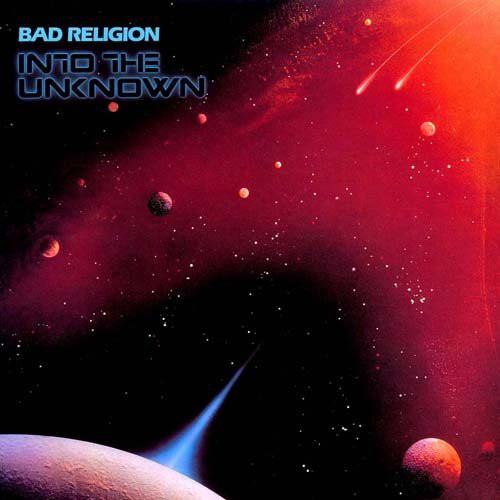
This album was the easiest to rank as the worst as it?s probably one of the only albums that nearly every Bad Religion fan will agree is the worst, even the band themselves largely ignore the record, treating it like a black sheep. For their sophomore release, BR were still figuring out their sound and because of this they decided to try out a variation of new-wave/prog-rock, incorporating random effects, synth and various other instrumentation into the mix. The end result is fairly lacking and subsequently it?s the only record of theirs that I?ve only listened to a handful of times as it takes patience to get through. Diehard fans tend to be the only ones who?ve really given this record a chance with most others being severely disappointed due to the fact that it came out right after the critically acclaimed and far different sounding How Could Hell Be Any Worse?. Notably this is the only album missing bassist Jay Bentley.
Best Tracks: Billy Gnosis, Losing Generation, and You Give Up
17. No Substance (1998)
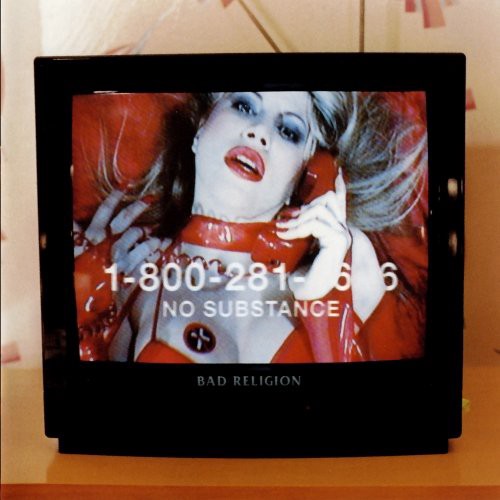
This album?s name is about as perfect as it gets to describing the contents of what the album offers. Although the record embarks on a more personal journey into Greg Graffin?s life, the end-product leaves the listener wanting more, such as better hooks, production, and overall better songwriting. The album reeks of misdirection, everything comes off just slightly wrong and, if a record can, the end result gives off an ever-so-slightly dirty feel ? perhaps as a sign of where music was headed in the mid-90s or as an effort to reach a new audience. This is one of the 3 albums missing cofounder and songwriter Brett Gurewitz. Perhaps his inclusion could have helped steer this record in a better direction. Clocking in at nearly 42 minutes, this is the second longest BR record, showing that quantity doesn?t offset quality.
Best Tracks: Hear It, In So Many Ways, and The Biggest Killer in American History
16. The New America (2000)
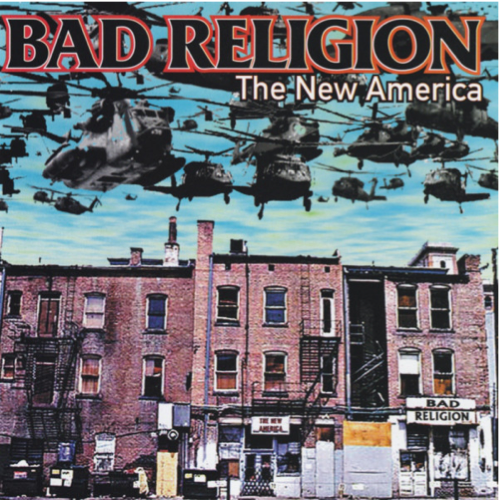
The 3rd and last album to be released without founder Brett Gurewitz, this album (proceeding No Substance) serves as a slight improvement over the previous effort, but stills comes out as a hollow shell of what Bad Religion is capable of. Like the album cover, the record comes across a bit cheap and lackluster, perhaps this was malaise from extended years on a major label (which ended after this album), but regardless, this was certainly a blemish in BR?s catalogue which they were luckily able to around from on their next albums.
Best Tracks: You?ve Got a Chance, There Will Be a Way, and Let it Burn
15. The Dissent of Man (2010)
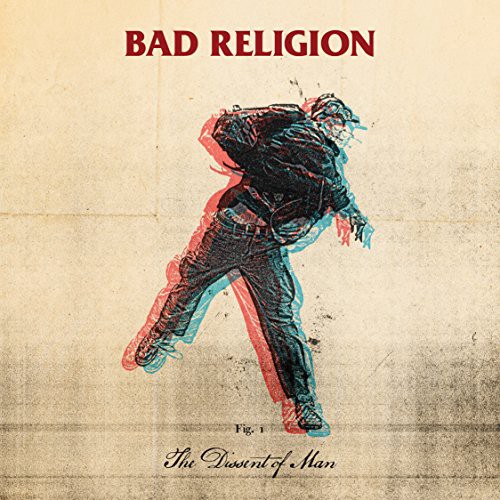
It?s hard to say what went wrong on this record, but having the longest runtime of any BR album (at just under 43 minutes), it seems that it may have been too many ideas that were brought to the studio and a desire to release them all rather than focus their energy and flesh out the best selections. This lengthy project results in a cumulation of potentially interesting directions that ultimately lie flat, with the vast majority of the record (essentially everything but the first 3 tracks) being nearly completely forgettable. Lyrically, this is also one of BR?s worst efforts with a few tracks coming across as almost cringeworthy in their delivery. The percussion sound great, but that?s not much for a consolation prize.
Best Tracks: Resist Stance, The Day the Earth Stalled, and Only Rain
14. Christmas Songs (2013)
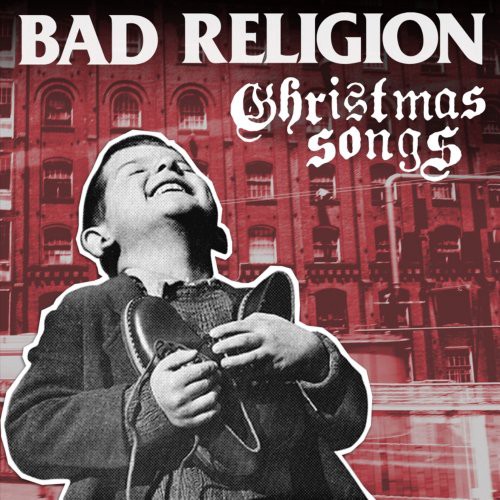
Some people may not include this album in BR?s studio album discography, but I will. While it may seem crazy to rank an album of Christmas cover songs (and 1 Bad Religion song) higher than some of their original albums, it?s partially due to the sheer oddity of it being made in the first place. BR isn?t a band you would think would make a covers record and if they did, you certainly think they would choose Christian themed Christmas songs, but here we are. The amazing thing about this record is that doesn?t sound at all like they did this on a whim, but rather put a lot of work on it, giving the covers a much needed breath of fresh air and energy.
Best Tracks: O Come All Ye Faithful, O Come, O Come, Emmanuel, and Hark! The Herald Angels Sing
13. Recipe For Hate (1993)
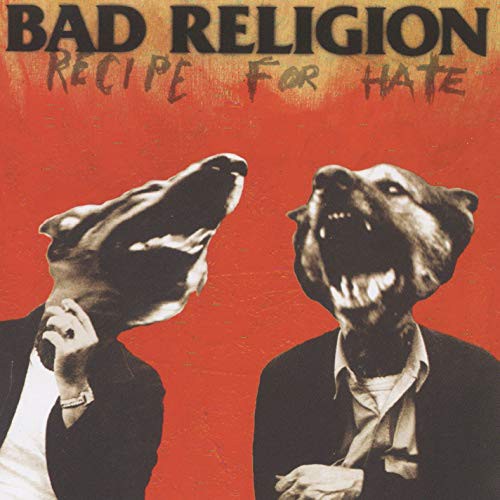
One thing I can?t fault this album on is its originality ? it really stands out in the BR catalogue, but at the same time, it also feels like a move in the wrong direction, favouring a slower tempo compared to the majority of their songs and incorporating a somewhat bluesy rock throughout ? even including an occasional steel guitar lead. If you prefer music at a slower pace than this might be the album for you, but in comparison to the rest of their discography, this one stands out, but mostly for all the wrong reasons, while still providing a few unique gems.
Best Tracks: Don?t Pray On Me, Skyscraper, and American Jesus
12. Age of Unreason
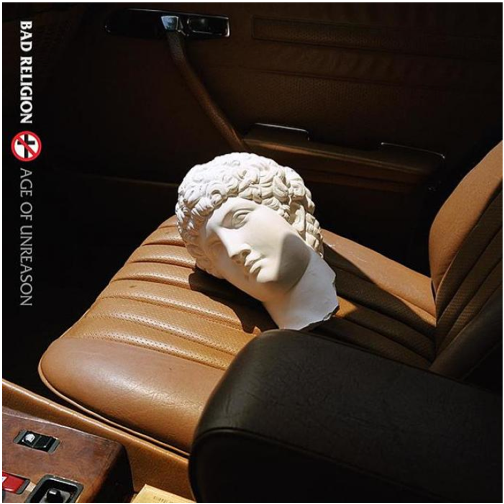
This is the first album in nearly 20 years without longtime members Greg Hetson (guitar) and Brooks Wackerman (drums). While those 2 are responsible for a lot of what BR has been able to accomplish throughout their time with the band, I was still excited to see what new blood could bring to the already quite established sound of BR. Sadly, while this album is without a doubt good, it lacks any really stand-out tracks and doesn?t really have a sound of its own, rather borrowing ideas and sounds from many of their previous records: ?Do The Paranoid Style? and ?Faces of Grief? have a heavier, more crunchy style that would have fit on New Maps of Hell. ?Lose Your Head?, ?Candidate?, and ?Big Black Dog? could?ve found a home on The New America, while ?My Sanity? sounds like an outtake from Recipe For Hate. The rest of the tracks feel similar to much of their post-2002 songs, but lack as much urgency and technical prowess, most notably in the area of the percussion which wasn?t able to match Wackerman?s previous capabilities. Overall, it?s a fine album, but just one that lacks its own voice and is unlikely to garner many new fans.
Best Tracks: Chaos From Within, End of History, and Old Regime
11. How Could Hell Be Any Worse? (1982)
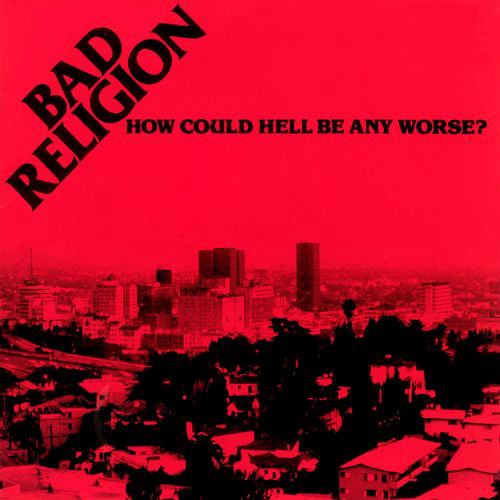
The album that started it all off and, I imagine, the crown jewel of BR albums for many fans. When ranking these records, this (and the one below this) were the hardest to rank. How do you rank such a genre-defining album and more importantly, where do you place the importance of an album in regards to the growth the band has shown on subsequent albums? Personally, I think a band should be rewarded in how they?ve been able to improve (in all of the different intangibles) and Bad Religion have proven themselves as a band of growth? and that?s why this record is ranked where it is. It?s a great and weird record, darker than any of their others and full of youthful, apocalyptic energy ? a picture of a band with their entire future ahead of them. Would they continue down a darker path of more goth or metal style or go the direction we now know they went? It was hard to say at the time.
Best Tracks: Fuck Armageddon?This is Hell, White Trash (2nd Generation), and Doing Time
10. Suffer (1988)
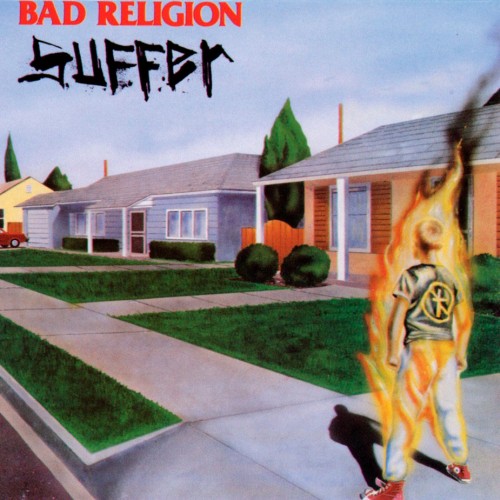
Despite placing this record in the middle of the rankings, I still consider it to be maybe the most important record for Bad Religion. After the Into the Unknown mishap, the band could have called it quits and been done forever, but much like the movie Terminator proceeding to T2: Judgement Day, Suffer proved to be a regrouping for the band and the album that, more than any other, established the sound of BR for decades to come. It?s less dark than HCHBAW? and the production level has increased, as well as songwriting and playing ability for the band so it checks the boxes most would expect out of a band?s growth. The biggest takeaway is that without this record, there?s a potential chance that the sound of melodic punk in the 1990s could have gone in very different direction.
Best Tracks: Give You Nothing, Forbidden Beat, and Suffer
9. Against the Grain (1990)

It was tough to rank this album above Suffer, but I just kept asking myself ? ?if Against The Grain had come out first, would there be any doubt that it?s a better album?? I think it?s clear. It contains all the same great elements that make Suffer a classic, such as extremely well-written songs, exceptional lyrics, and the enthusiastic vocals of a young Graffin, but it?s elevated by the stronger focus on song structure and the obvious improvement on musicianship that comes from years of recording and playing live performances together. ?Unacceptable? alone shows that the band had no plans on slowing down or relinquishing their energetic grasp on the zeitgeist of 1990.
Best Tracks: Turn Off the Light, Anesthesia, and Unacceptable
8. True North (2013)
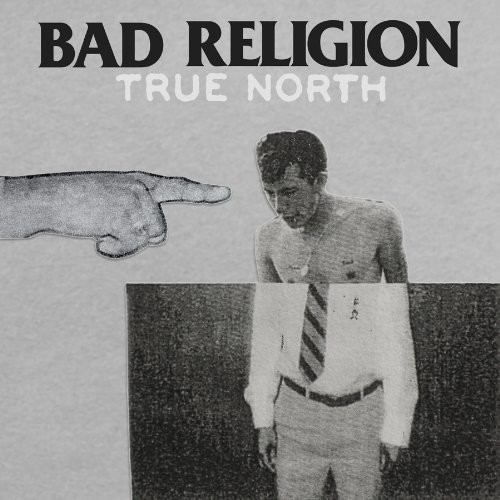
This album is a collective nod to the Bad Religion of the past, the members of the band themselves admitted to wanting to recapture that energy that permeated their earlier records and I must say, they pulled it off. As the record is a claim to younger years, it gets knocked down a bit in the rankings for lacking more originality, but with that said, the record stills stands out by giving fans a nostalgic tour of how their late 80s records would have sounded with the technology and budget of today. You?ve really got to tips your hat to a band that has been going for as long as BR has, to be able to bring back the vitality that coursed throughout their early releases. Particular highlights of the album are ?Dharma and the Bomb? which provides an interesting new sound for the band and ?Nothing To Dismay? which sounds like it could have came right off No Control.
Best Tracks: Nothing To Dismay, True North, and Dharma and the Bomb
7. New Maps of Hell (2007)
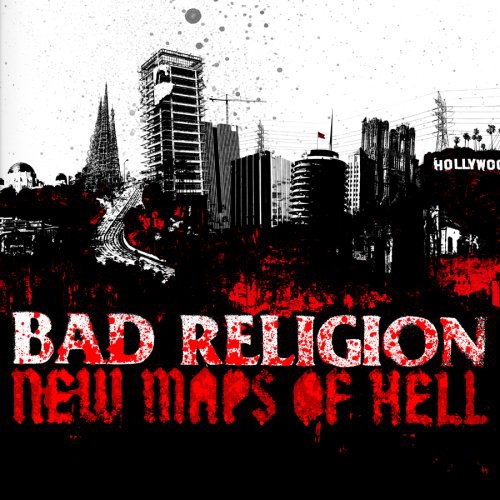
If I had decided to rank these albums before re-listening to them again I would have likely placed this one at a worse ranking, but upon listening to it again after having shelved it for awhile, I realized what a fantastic and truly unique Bad Religion album this one is. It finds the band embracing some of the heaviest styles of their career ? a style I don?t think they could have properly pulled off if it wasn?t for the expert drumming of Brooks Wackerman. The album not only turns the distortion on vocals/instrumentation up a couple notches, but it also has an underlying tone of anger throughout, giving it a level of critical importance that isn?t matched (at least in the same way) as other albums. This record gets a slightly better rank for daring to take a chance and try something slightly new, even after all of these years.
Best Tracks: New Dark Ages, Dearly Beloved, and Requiem for Dissent
6. Generator (1992)
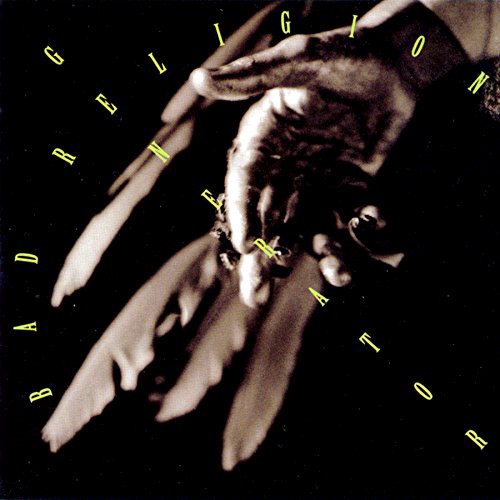
With only 11 songs, Generator has the shortest tracklist of any BR record. Generator is also unique in that the quality of it as an album is less derived from a whole and instead stands out by how astonishingly good individual songs on the record are (specifically those written by Brett Gurewitz). ?Heaving Is Falling? and ?Atomic Garden? are not only the two best songs on the record, but are two of BR?s best songs of all time ? the quality of these tracks are able to significantly lift up the overall strength of Generator and is why this album ranks as high as it does. This album finds the band around their pinnacle of lyrical tenacity too ? striking lines that one would expect more in a book of poetry rather than your standard punk album.
Best Tracks: Heaven Is Falling, Atomic Garden, and Two Babies in the Dark
5. The Gray Race (1996)
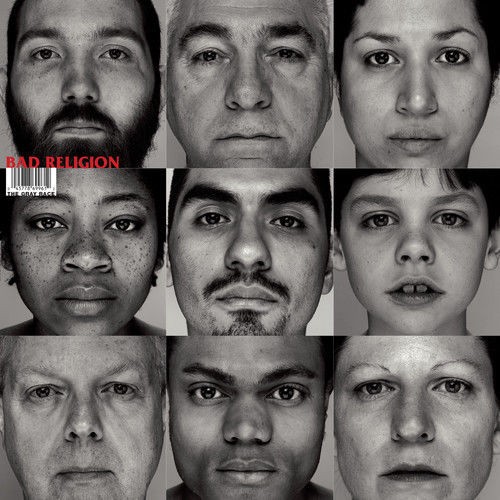
The Gray Race has got to be the most underrated of all of BR?s albums ? even on re-listening to their discography I found myself coming back to this record over and over because I didn?t remember it being so perplexingly excellent. The Gray Race is by far the best album that Brett Gurewitz is absent from and I can only imagine that his disappearance allowed Graffin to try some things out that Gurewitz previously didn?t agree with (but this is purely speculative). The record might get passed over by many as it?s difficult to pinpoint the best song(s), but this is only because it does such a perfect job of being a wholly complete album. From a sum-of-the-parts standpoint, I would say this, in many ways, is the best record BR has ever created. This may not be mere coincidence and instead a result of having only one chief songwriter in Dr. Graffin.
Best Tracks: Pity the Dead, Cease, and Ten in 2010
4. Stranger Than Fiction (1994)
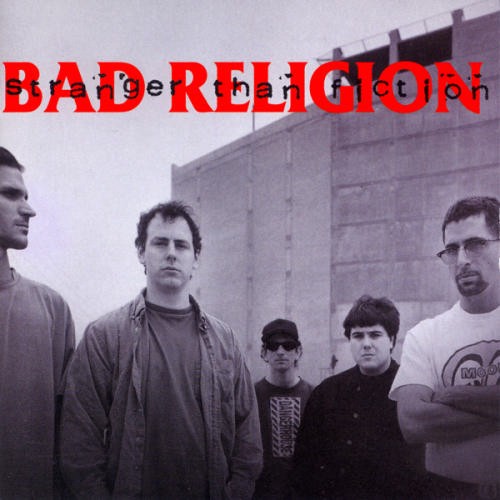
Stranger Than Fiction marked Bad Religion?s beginning foray into being on a major label and, in turn, their introduction to a larger more mainstream audience. The move to a major luckily didn?t disappoint at all (at first) and perhaps the pressure of a potential larger market even made the band strive for higher ceilings ? either way this record marks the band at one of their most complete levels, hitting on all cylinders and offering very few things to criticize about. In fact, one of the only things I can really say negatively about this record is the line ?life is the crummiest book I ever read ? there isn?t a hook? from the song ?Stranger Than Fiction?, every time I hear that line, I visually cringe ever-so-slightly. Also, I love Tim Armstrong, but his inclusion in the song ?Television? shows that he just doesn?t work with Bad Religion?s sound. Fun fact: it is the only album cover to feature the band on the front.
Best Tracks: Inner Logic, 21st Century (Digital Boy), and Incomplete
3. The Process of Belief (2002)
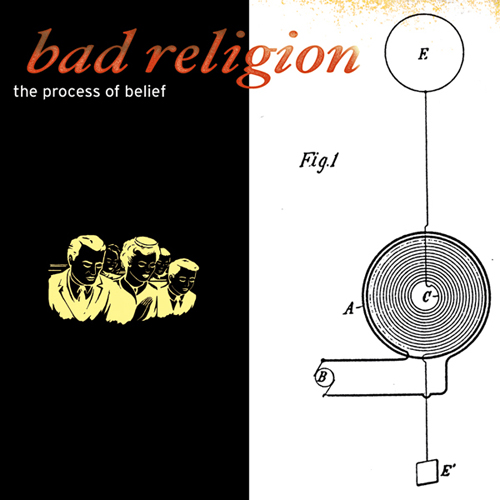
The return of prodigal son Brett Gurewitz and new drummer Brooks Wackerman brought a much needed reboot to the band after the rough 1998?2000 era of records. From the moment the record begins, the listener is welcomed with a blast of vivacity where everything sounds just right. Graffin sounds fresh and excited on his vocals, Wackerman?s drumming is a perfect accompaniment, always able to complement a song and make it better. With Gurewitz rejoining the band, they then had 3 guitarists to work with and they used the opportunity to make an extremely layered record while still retaining the punk roots that they?re known for. If there is a ?second coming? for Bad Religion, this record certainly ushered it in and helped to reestablish why the band was beloved in the first place. The entirety of the album has such a big feel to it that really sets it apart by showing significant focus.
Best Tracks: Epiphany, Kyoto Now!, and Evangeline
2. No Control (1989)
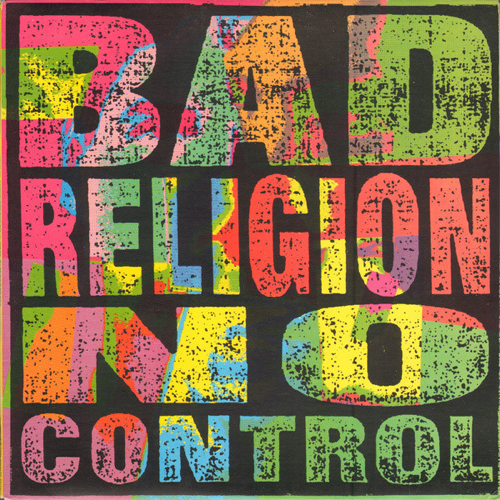
As much accolades as you can throw at Suffer, I think the sheer brilliance of No Control remarkably overshadows its accomplishments. It takes everything that was great from Suffer and still improves upon it. The lyrics are more poignant, the musicality improves very noticeably, particularly on ?I Want To Conquer The World? where the intro solo, to this day, still blows me away by its greatness. This is a passionate album right on the cusp of the end of the 80s which seems to perfectly encapsulate everything that was happening at the time and the general feeling of many outcasted Americans.
Best Tracks: I Want to Conquer the World, You, and No Control
1. The Empire Strikes First (2004)
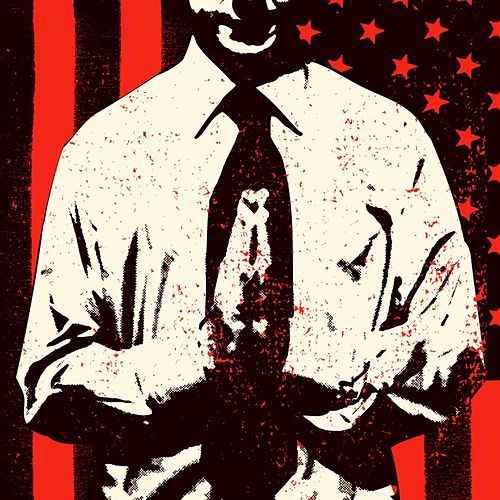
So how did this album make my top list when there?s so many amazing records to choose from to be the best? It all came down to which record, at the end of the day, was I most excited to listen to ? and that record has, the majority of the time, been The Empire Strikes First. The album just seems to fit every mood that I?m in, or at least adapts to it. What does this album have going for it? I think from a musical standpoint, it catches the band at their absolute peak, no other BR record fully utilizes the benefits of having 3 guitarists quite as much as this one. The percussion is utterly perfect with beautiful, complicated drum fills joined by the best production I?ve ever heard on drums before ? that?s right, this is my absolute favourite album of all time from a drumming standpoint, I just can?t find a single flaw in it. What else is there to say? The ?Overture? intro is unique and helps set up the giant sound of the record. There?s a rap section from Sage Francis on ?Let Them Eat War? which I don?t think any fan of BR would expect or would think would turn out well? yet it does. The lyrics are intelligent and as on-point as any BR album, both politically and religiously critical. I just can?t find any faults on this record, even the bonus tracks would be some of the best songs on other albums.
Best Tracks: Los Angeles is Burning, Let Them Eat War, and Beyond Electric Dreams
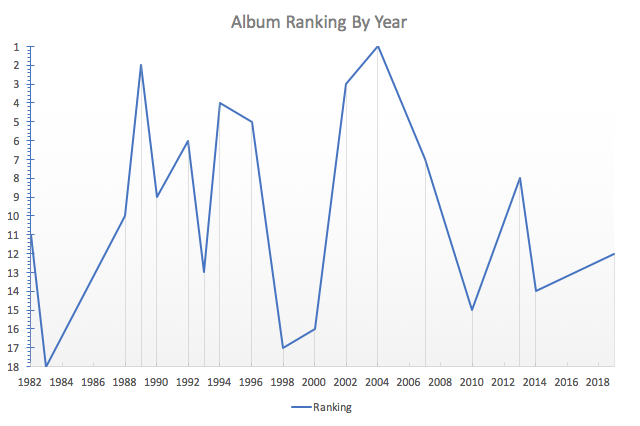
Overall Band Ranking: A+
Pros: Intelligent and diverse lyrics, beautiful songwriting and musicianship. Influenced almost every melodic punk band. Established one of the most important record labels in the punk industry. Redefined themselves several times without (for the most part) losing what originally made them great.
Cons: Second album was a giant misstep. A couple records in the late 90s were tainted by a major label sound.
